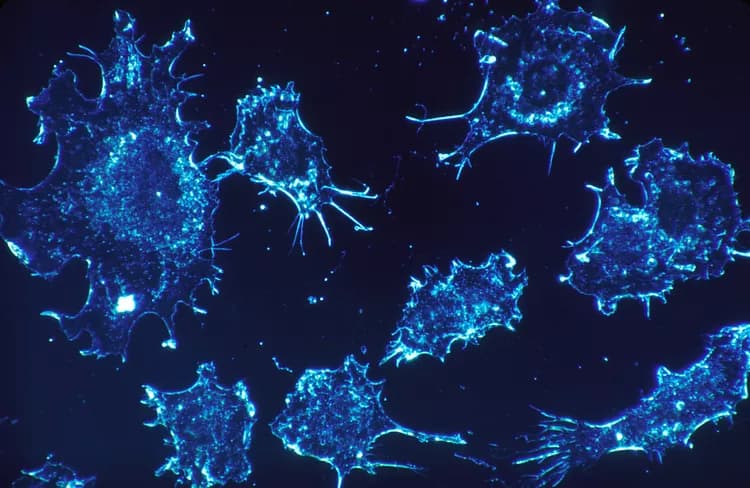
Protecting 'Self-Reactive' Immune Cells So They Can Fight Melanoma
Researchers at the University of North Carolina Lineberger Comprehensive Cancer Center are using what they know about a rare, inherited autoimmune disease to turn the body's defenses against melanoma.
In JCI Insight, researchers report on a potential new way to fight melanoma by blocking one of the immune system's checks and balances. Combining their strategy with an existing immunotherapy treatment that works by releasing the "brakes" on immune cells, they found they could shrink melanoma tumors, and prolong survival in preclinical models for melanoma.
"We have immune cells called T-cells that are really good at killing off cancer cells, but there is an inhibition system in place to prevent autoimmunity," said the study's senior author Maureen Su, MD, UNC Lineberger member and associate professor in the UNC School of Medicine Division of Pediatric Endocrinology. "We have found a way to get rid of their inhibition so they can go and fight off cancer cells."
The American Cancer Society estimates more than 87,000 cases of melanoma will be diagnosed in the United States this year. Melanoma accounts for only about one percent of skin cancers, but it causes a large majority of skin cancer deaths.
The researchers are developing a potential new immunotherapy strategy for melanoma based on their insights into Autoimmune Polyendocrinopathy Type 1, a rare, inherited disorder in which T-cells attack healthy cells and tissues. People with this condition can develop vitiligo, a condition in which their T-cells attack and kill the color-producing skin cells known as melanocytes, causing patches of color loss in skin. Researchers asked: If melanoma cells are the descendants of melanocytes, can those T-cells that are normally blocked from attacking melanocytes be somewhat activated to kill melanoma?
People who have a mutation in the Autoimmune Regulator, or Aire, gene cannot destroy T-cells that are "self-reactive. " Therefore, these "self-reactive" T cells survive destruction within an organ called the thymus, the central immune organ in which T-cells mature, and attack healthy cells and tissues, including melanocytes.
"The majority of T-cells will go and fight off bad things like fungus, bacteria and viruses," Su said. "But a small percentage of these T-cells, by chance, can recognize cells that are 'self.' The people who are missing a functional Aire gene lack the ability to delete self-reactive T-cells. But what we realized is that while they're prone to auto-immune disease, they're probably pretty good at fighting off cancer, too."
In an effort to block Aire and prevent the immune system from killing off T-cells that might recognize melanoma, researchers tested a compound, an anti-RANKL antibody in mice. They studied the effects of this treatment in combination with ipilimumab, a U.S. Food and Drug Administration-approved immunotherapy. Ipilimumab works by releasing the brakes on T-cells so they can attack tumors. However, not all patients respond to these drugs. Researchers believe that along with their Aire-blocking compound, they can allow more T-cells to survive so they can go on to attack melanoma.
They determined that ipilimumab improved survival in mice that had a genetic mutation that caused a partial loss of Aire. In addition, combining the anti-RANKL antibody with ipilimumab produced a synergistic effect and helped prolong survival.
To investigate if blocking Aire has a synergistic effect with ipilimumab in humans, researchers drew from a study of people who have natural genetic variations for the Aire gene that are known to make the Aire protein unstable and therefore short-lived in normal cells. A study of six people with these variations, out of 79 patients who were previously treated with ipilimumab for metastatic melanoma, found a higher likelihood of progression-free survival. However, because the incidence of these naturally-occurring polymorphisms is less than 10 percent in the overall, researchers believe using the anti-RANKL antibody could allow them to produce this same effect in more patients.
There is already a RANKL inhibitor in clinical use, but denosumab is approved for a different indication -- osteoporosis. UNC Lineberger researchers are planning to launch an investigator-initiated clinical trial year to assess whether the combination denosumab with the checkpoint inhibitor pembrolizumab is more effective than pembrolizumab alone for treating patients with advanced melanoma.
"The objective overall response rate for the single agent pembrolizumab was up to 35 percent, but why shouldn't more patients respond?" said UNC Lineberger's Stergios Moschos, MD, an associate professor in the UNC School of Medicine Department of Hematology/Oncology and a co-author of the study. "Combined checkpoint inhibitor treatments, such as ipilimumab-nivolumab, have produced higher response rates, but they can have serious side effects. So everybody is trying to figure out: Are there alternative ways to make these treatments safer and more effective?"
Materials provided by UNC Lineberger Comprehensive Cancer Center. Note: Content may be edited for style and length.
Disclaimer: DoveMed is not responsible for the accuracy of the adapted version of news releases posted to DoveMed by contributing universities and institutions.
References:
Pearl Bakhru, Meng-Lei Zhu, Hsing-Hui Wang, Lee K. Hong, Imran Khan, Maria Mouchess, Ajay S. Gulati, Joshua Starmer, Yafei Hou, David Sailer, Sandra Lee, Fengmin Zhao, John M. Kirkwood, Stergios Moschos, Lawrence Fong, Mark S. Anderson, Maureen A. Su. (2017). Combination central tolerance and peripheral checkpoint blockade unleashes antimelanoma immunity. JCI Insight. DOI: 10.1172/jci.insight.93265
Related Articles
Test Your Knowledge
Asked by users
Related Centers
Related Specialties
Related Physicians
Related Procedures
Related Resources
Join DoveHubs
and connect with fellow professionals

0 Comments
Please log in to post a comment.